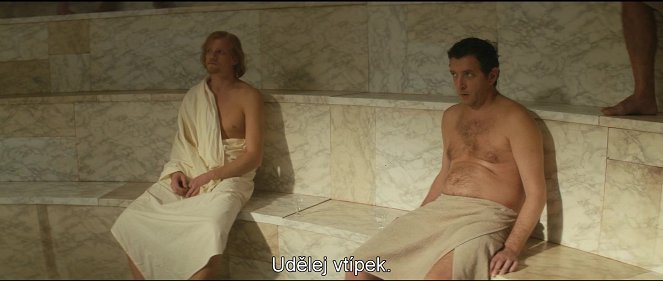Director:
Michael IdovGuión:
Michael IdovCámara:
Alexander ŠurkalaReparto:
Aleksey Agranovich, Yuriy Kolokolnikov, Полина Ауг, Alisa Khazanova, Olga Dibtseva, Anatoliy Kotenyov, Pavel Ilin, Artyom Grigorev, Semyon Shteynberg (más)Sinopsis(1)
This fictional biographical drama shows a week in the life of a prominent Soviet stand-up comedian, Boris Arkadiev. Boris chose the conformist path that allows him to perform in public, but it also destroys him from the inside. This directing debut by Mikhail Idov, who is behind the screenplay for Summer, a film about iconic Soviet bands, once again addresses the issue of preserving one's inner freedom and integrity under a totalitarian regime. (Febiofest)
(más)Reseñas (2)
I have a weakness for this type of film, which balances on the edge of humor and depression. Moreover, after a tough TV start (I don't mean the first "home video" sequence; that is divine), the film finds a fairly moderate creative key, which gives it a satisfactory dose of retro, shabbiness and a certain dreaminess. The story of a useless man who tries to joke carefully in a time that consistently suppresses humor, has its clear highlights (the great scene from Baikonur) and is accompanied by a gently absurd vibration. The Humorist is a metaphor not only of real socialism as a pragmatic time period without illusions, but also of the relationship between power and humor in Russia in general. The Humorist combines a comedy about conformity and a drama about anxiety. Like Dovlatov, this film about internal riots is without fireworks, and like Leto (for which Idov is the screenwriter), it captures a sleepy time without great heroes.
()
The 1980s in the Soviet Union weren't exactly a golden age for humor. The stage performer Boris Arkadyev, brilliantly played by Aleksey Agranovich, is making his way through this socio-political mess as best he can, and it is mostly a very unpleasant sight. His inner rebellion against the regime eventually bubbles to the surface in the sauna, where his comrades make it clear that they are not going to accept this style of banter. The contribution of The Humorist lies mainly in the fact that it contains critical allusions to the current conditions in Russia. (80%)
()

